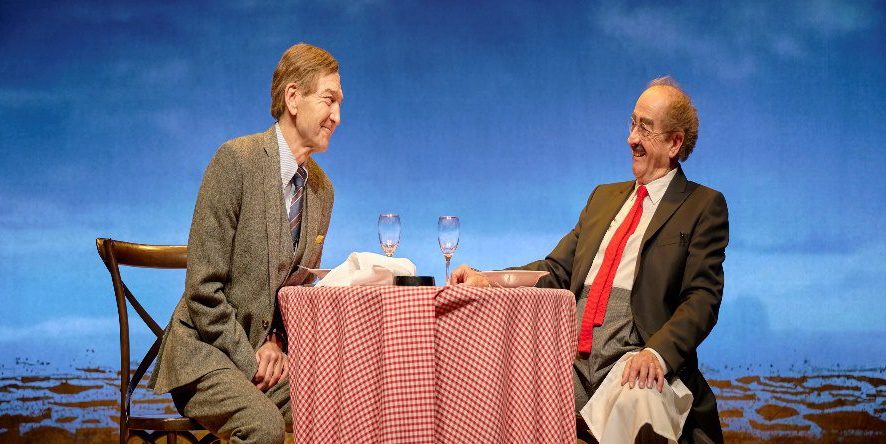This new play by Frank McGuinness began life in Ireland to mark the twentieth anniversary of the b*spoke theatre company, and now it travels to Belfast, Oxford and London. Perhaps the most remarkable thing about it is that it is based on fact – Groucho Marx and T.S.Eliot really did have dinner with each other, shortly before Eliot’s death, and both were enthusiastic followers of each other’s work. What McGuinness weaves out of this apparently incongruous incident is an absurdist fantasy peppered with overt and more sly references to the work of both men and framed with a character of McGuinness’ own invention.
The set is like something out of Beckett – sawdust on the floor, a couple of chairs and a table, table settings but no food and a backdrop of an open sky that shifts colour at intervals. Lights in globes hang from above. The Proprietor enters and summons up Eliot and Marx: the main action is the cut and thrust of their conversation, but the Proprietor returns at intervals (without serving any food) to deliver imperious monologues of a bleak and absolutist cast of mind. She is an exaggerated ‘grande dame’, a recognisable dramatic type in the works of this author and closes out the play too with a bleak denial of significant overall meaning. Ingrid Craigie makes the most of these monologues and a fine set of regal costumes devised by Joan Bergin.
The heart of the play is the relationship between Eliot and Marx, superbly recreated here by Greg Hicks and Ian Bartholomew. Both of these fine actors succeed in presenting much more than impersonations, though the physical resemblance and familiar mannerisms are very well done, particularly so in the case of Bartholomew. The verbal repartee is brilliant and unexpected with many fantastical riffs typical of McGuinness’ spooling imagination. It serves to remind you that below the surface both these figures shared a restless preoccupation with the scope and potential of language that pushed at the boundaries of absurdity. Not so different after all.
Lest it be thought that there are too many words, this is a play much broken into by music. There is often a lot of singing and dancing in McGuinness’ plays that seeks to carry ebullience or pathos into a fresh dimension. Here it is ebullience that dominates, with a spritely invocation to champagne and a charming reminder of the music hall heroine, Marie Lloyd. All three actors relish the verbal gymnastics of a witty, allusive script and director Loveday Ingram has ensured that there is constant movement and joshing interaction even extending to magic tricks.
In a way it is play about nothing happening. Topics of conversation come and go. There are wonderful verbal riffs – such as a complete reimagining of Shakespeare’s ‘King Lear’ where Cordelia is a boy and cholesterol is the family’s biggest enemy. But ultimately it appears to be a play about ageing, waning powers of creativity, and the extent to which they are defined by their roots. Finally the issue of we can plausibly leave behind, darkens the tone in the final sections. However, past, present and future are connected, does any of them ever really leave a tangible trace? While this sounds chilling in fact the play is often very funny in both text and situation, while not shying away from subtly referencing Eliot’s antisemitism and other darker themes.
The great quality of the play if you open yourself up to it is that it works on a number of levels simultaneously. There is a dazzling display of learning and literary device, as you might expect from a former professor of creative writing; but it is also ribald and unbuttoned in a wholly demotic way too. With such a broad spectrum of qualities it deserves to succeed with audiences on tour and into further productions. I suspect that this is going to be one of several plays for which McGuinness will be remembered – ironic in a play that problematises the whole possibility of legacy.

